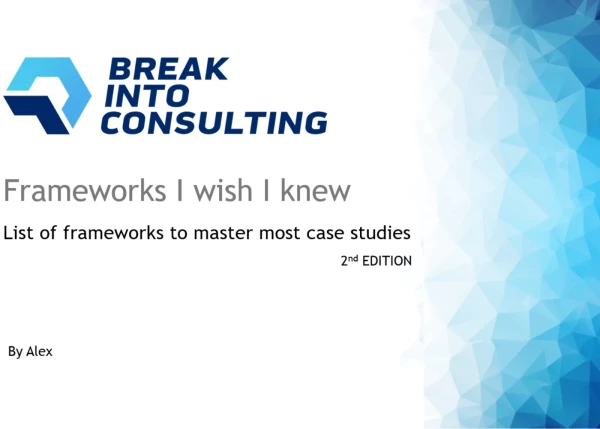Fully agree with the point in your question: Don't use standard frameworks. That doesn't mean you need to reinvent the wheel, as David says. Wording is super important: If it's a services company, don't talk about products or goods. Also, if something from a framework doesn't apply at all, don't even mention it. (e.g., for a software company, there tend not to be variable costs or input costs). Why is this important? Imagine you are a consultant talking to a client, and to solve their problem you start with a standard textbook framework which she knows, and use general language. The CEO's perception of you will not be good.
Regarding which frameworks to use, I find important:
- Revenues = Quantity * Price. Important to adapt it immediately in your head; for a hotel, it could be #booked rooms * average rate, or # of total rooms * utilization * average rate. Also, never forget additional/side revenue streams, in this example maybe room service/breakfast or events or kickbacks from tourist attractions.
- Cost = variable cost * quantity + fixed cost. Definitely learn the main cost components (personnel, rent, ...). In a case about cost, you need a reference point to find out if costs are high or ok. To get to the bottom of this, I would ask for benchmarks, either external (competition, adjacent industries), or company internal (e.g., different factories/sites for a manufacturing company, different stores for a retail company)
- Profit = Revenues - Cost. Any question like "profitability has been down", "need to increase profit", ... Fill components with details from 1. and 2. and ask questions to get to the root cause.
- Investments. Any question like "Should I buy X", "What price to bid at an auction", "How much is X worth", "should we invest in X", or make or buy decisions. Basically, formula is equal to future profit streams (profit over time), discounted to today, minus the investment amount. Detail profit out via 3 -> 1, 2 and compare with price/investment.
- Growth. Basically any question around "how can we increase business". For this, the 4Ps work, but I also like the Ansoff matrix (grow with new or existing products into existing or new markets - hint: generally don't do new products in new markets :).
These "frameworks" can already get you very far. Really important however to adapt them as quickly as possible to the specific case, in both content and wording: "Since we are already active in North America, we can grow by expanding to other regions, e.g., Asia, Europe or Africa" sounds much better than "we can go into new markets".
Hope that helps!
p.s.: Btw, have never seen a case where Porters 5-forces works well :)



